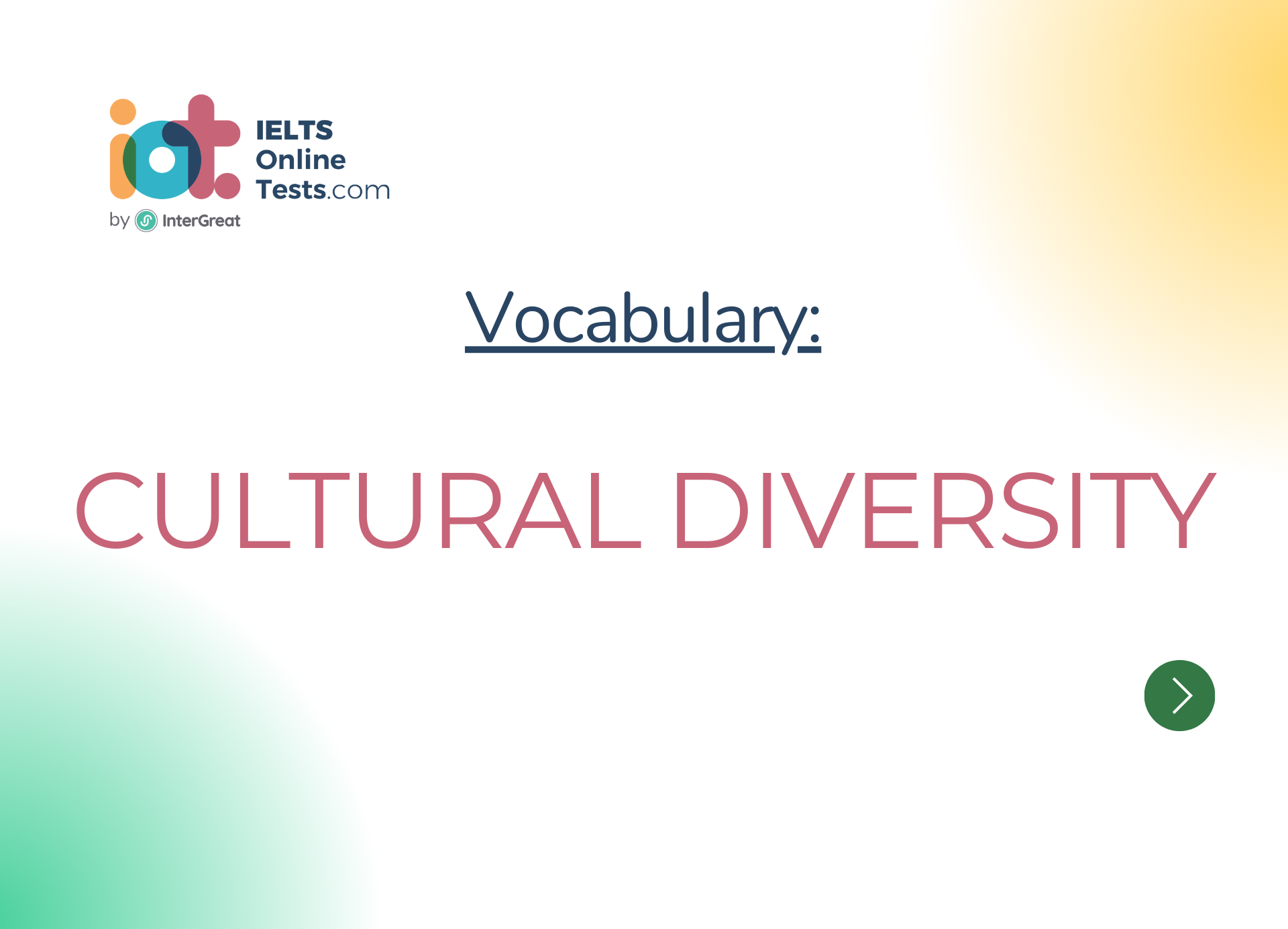
Cultural diversity
Here is a detailed list of vocabulary related to cultural diversity, suitable for IELTS band 4.5-6.0:
Cultural Diversity:
The coexistence of different cultural and ethnic groups within a society, showcasing their unique traditions, beliefs, and customs.
Multiculturalism:
The practice of promoting and valuing cultural diversity, encouraging the peaceful coexistence of various cultural groups.
Ethnicity:
The shared cultural identity and heritage of a particular group of people, often based on factors like language, ancestry, and historical experiences.
Heritage:
The cultural traditions, customs, and practices that are inherited from previous generations and contribute to a community's identity.
Inclusivity:
The act of creating an environment that welcomes and respects people of all cultural backgrounds, fostering a sense of belonging for everyone.
Tolerance:
The acceptance and appreciation of cultural differences, promoting harmony and understanding among diverse communities.
Integration:
The process of incorporating individuals from different cultural backgrounds into the larger societal fabric, encouraging interaction and mutual understanding.
Assimilation:
The process by which individuals or groups adopt the customs and values of the dominant culture, potentially leading to the loss of their cultural identity.
Pluralism:
The coexistence of multiple cultural groups within a society, where each maintains its unique identity while engaging with others.
Cultural Exchange:
The sharing of cultural elements, such as traditions, music, art, cuisine, and knowledge, between different communities or countries.
Globalization:
The increasing interconnectedness of the world, facilitating the exchange of ideas, cultures, and goods on a global scale.
Intercultural Communication:
The exchange of information and ideas between people from different cultural backgrounds, aiming to foster understanding and cooperation.
Stereotype:
An oversimplified and often negative generalization about a particular cultural group, leading to biases and misconceptions.
Prejudice:
Negative attitudes and beliefs based on preconceived notions about a certain cultural group, often leading to discrimination.
Discrimination:
Unfair treatment or exclusion of individuals based on their cultural background, ethnicity, or race.
Cultural Sensitivity:
The awareness and respect for cultural differences, leading to more effective communication and collaboration across diverse groups.
Cultural Heritage:
The legacy of physical artifacts, traditions, and customs inherited from past generations, contributing to a community's cultural identity.
Ethnocentrism:
The tendency to judge other cultures by the standards and values of one's own culture, often leading to misunderstanding and conflicts.
Diversity Training:
Programs designed to promote cultural awareness, sensitivity, and understanding among individuals and organizations.
Cultural Adaptation:
The process of adjusting to and adopting aspects of a different culture when living or working in a foreign environment.
Cultural Awareness:
The knowledge and understanding of different cultural practices and customs, promoting empathy and respect for cultural differences.
Cross-cultural:
Involving interactions between people or groups from different cultural backgrounds.
Cultural Heritage Preservation:
Efforts to protect and conserve cultural artifacts, traditions, and knowledge for future generations.
Cultural Celebration:
Festivals or events that highlight and honor the cultural traditions and heritage of a specific community.
Cultural Fusion:
The blending of elements from different cultures, leading to the creation of new and unique cultural expressions.
Cultural Identity Crisis:
A sense of confusion or conflict experienced by individuals when their cultural identity is challenged or undermined.
Cultural Exchange Programs:
Initiatives that facilitate cultural interactions and learning experiences between people from different countries or backgrounds.
Cultural Revival:
The revitalization of traditional cultural practices and customs that were once endangered or suppressed.
Cultural Pluralist Society:
A society that encourages and values the presence of diverse cultural groups, promoting coexistence and mutual respect.
Cultural Sensitivity Training:
Education aimed at enhancing individuals' awareness and understanding of cultural differences to foster positive interactions and reduce misunderstandings.
Cultural Norms:
Accepted and expected behaviors within a particular cultural group.
Cultural Differences:
Distinctive features and practices that set one culture apart from another.
Cultural Sensitivity Training:
Education aimed at enhancing individuals' awareness and understanding of cultural differences to foster positive interactions and reduce misunderstandings.
Cultural Identity:
The sense of belonging and attachment to a particular culture or cultural group.
Cultural Assimilation:
The process by which individuals or groups adopt the customs and values of the dominant culture, potentially leading to the loss of their cultural identity.
Cultural Festival:
An event that celebrates and showcases the traditions, art, and music of a specific cultural group.
Cultural Competence:
The ability to interact effectively and respectfully with people from diverse cultural backgrounds.
Cultural Ambassador:
An individual who promotes cross-cultural understanding and exchanges between different societies.
Cultural Preservation:
Efforts to protect and maintain the authenticity of cultural practices and heritage.
Cultural Awareness Program:
Initiatives that aim to educate people about different cultures and promote tolerance and respect.
Cultural Integration:
The process by which individuals from different cultural backgrounds come together to form a cohesive and harmonious society.
Cultural Barrier:
Obstacles that hinder effective communication and understanding between people from different cultures.
Cultural Harmony:
A state of peaceful coexistence and cooperation among culturally diverse groups.
Cultural Exchange Student:
A student who participates in a program that allows them to study abroad and experience a different culture.
Cultural Anthropology:
The study of human cultures, societies, and their development.
Cultural Homogeneity:
The dominance of a single culture within a specific region or society.
Cultural Sensitivity Workshop:
A training session that helps individuals develop cross-cultural communication skills and awareness.
Cultural Interaction:
The engagement and exchange between people from different cultural backgrounds.
Cultural Understanding:
The comprehension and appreciation of the beliefs, values, and customs of other cultures.
Cultural Enrichment:
The process of gaining knowledge and understanding by exposure to diverse cultural experiences.
These vocabulary words should help you discuss various aspects of cultural diversity and related topics in your IELTS writing and speaking tasks. Remember to practice using them in context to improve your language skills. Good luck with your studies!




